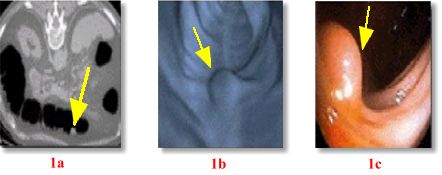 |
ADVANCED IMAGING CENTER PHYSICIAN NEWS |
February 11, 2002 |
3-D VIRTUAL COLONOSCOPY (VC)


 |
ADVANCED IMAGING CENTER PHYSICIAN NEWS |
February 11, 2002 |


Virtual Colonoscopy (VC) is a new method that allows 3-D visualization of the large bowel (colon) to detect polyps and cancers. Polyps are small growths in the colon that may become cancerous if they are not removed. Virtual Colonoscopy is a recently developed technique that uses a fast multi-slice helical CT scanner (MSCT) and computer 4D virtual reality software to look inside the bowel lumen without having to insert a long scope (Conventional Colonoscopy) or having to fill the colon with liquid barium (Barium Enema).
Patients need a cleansing preparation of their bowel prior to the test. The actual VC procedure will begin by having a small flexible rubber tube placed in the rectum, so that air can be introduced. A helical CT scan is then performed while the patient lies comfortably on the back (supine) and then on the stomach (prone). The total time required for the study is around 15 minutes. Because sedation is not required, patients are free to leave the CT suite immediately without the need for observation or recovery. Patients can resume normal activities immediately after the procedure and can eat, work or drive without a delay. When air is introduced in the colon, some patients experience minimal temporary abdominal cramping or "gas pains."
ACCURACY
Research has shown that Virtual Colonoscopy is better able to see polyps than Barium Enema and is nearly as accurate as Conventional Colonoscopy. Fig. 1 shows a polyp and Fig. 2 a flat cancer seen on 3 techniques: 2D axial CT (Fig. 1a, 2a-b), 4D VC (Fig. 1b, 2c), and conventional colonoscopy (Fig. 1c, 2d). Most patients report that the Virtual Colonoscopy technique is more comfortable than either Barium Enema or Conventional Colonoscopy. Studies suggest a very high sensitivity and specificity (96%) for the detection of polyps 1 cm or greater. Such polyps have significant malignant potential. Sensitivity for polyps less than 1 cm is significantly less. Although controversy exists as to the definition of a "significant" polyp with regard to size, polyps < 1 cm in size have a low probability of malignancy and the likelihood of any single lesion progressing to cancer is also small.
INDICATIONS
Indications for VC include screening for polyps, incomplete or failed colonoscopy, and preoperative assessment of the colon proximal to an occlusive cancer (defined as a tumor that cannot be traversed endoscopically). Virtual colonoscopy excels in the evaluation of the ascending colon, particularly the cecum due to the degree of distension achievable and the typical lack of spasm or muscular hypertrophy, which is seen in the sigmoid colon. It is therefore a useful complement to an incomplete colonoscopy. Any questionable abnormality will warrant a conventional colonoscopy procedure, thus resulting in GI referrals.
VC may become a screening tool for detecting colorectal neoplasia, potentially supplanting Conventional Colonoscopy as a tool for detecting lesions. Increased screening, with increased detection, should decrease the incidence of colorectal cancer, as premalignant growths can be found at an earlier stage. About 5% of colon cancers (flat cancers) arise from normal mucosa and not from polyps and are difficult to identify on conventional and virtual colonoscopy, while axial helical CT images improve detection of such cancers.
ScanHealth Program
AIC has been offering for some time a screening total-body scan program called ScanHealth, which includes a screening helical CT of the torso, helical CT coronary calcium scoring, and more optional 4D virtual colonoscopy. For more information, please call me personally at (661) 949-8111 and/or visit our website at www.aicLancaster.com. Ray Hashemi, MD
Ray H. Hashemi, M.D., Ph.D.
Director